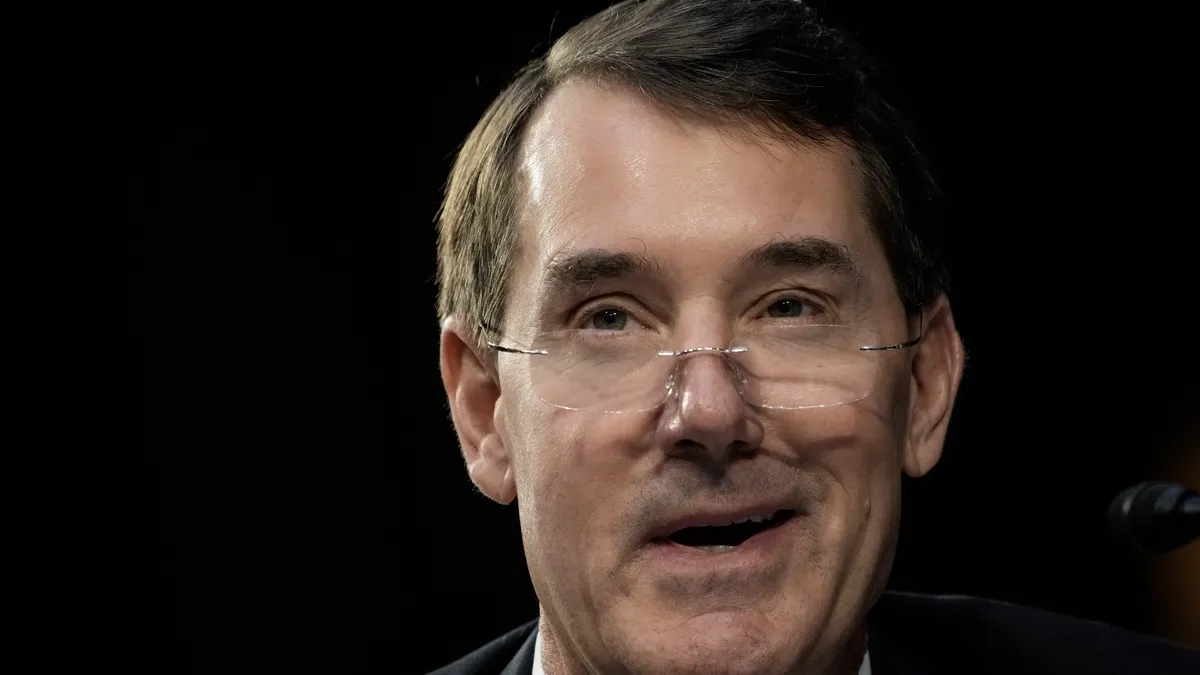PNC CEO Bill Demchak on Tuesday seemed to throw cold water on industry expectations around the incoming Trump administration ushering in an era of lighter regulation for banks.
When asked during an appearance at the annual Goldman Sachs financial services conference about the post-election potential for regulatory change, the CEO of the Pittsburgh-based super-regional said bank supervision “at the margin” may get a little easier.
“But I think people are a little bit too excited … that they’re just going to let everybody run free here,” Demchak said, laughing. “I don’t see that at all.”
Demchak does expect, fairly quickly, that the industry will see “perhaps the elimination of some of the more frivolous lawsuits and charges and changes to fees and other things.” The Consumer Financial Protection Bureau’s cap on credit card late fees has been one target of bank industry ire; a judge this week denied the bureau’s motion to dismiss a legal challenge to that rule.
As far as actual bank supervision and related regulation, however, “I don’t know that there’s going to be much relief on that,” the CEO said.
In the wake of Silicon Valley Bank’s 2023 collapse, regulators are intently focused on liquidity, he noted. He expects changes to liquidity requirements, with some debt issuance provisions; a long-term debt requirement that’s toned down from the 6% initially suggested; and a reworking of the liquidity coverage ratio.
Demchak expects having liquidity to cover some percentage of uninsured deposits is going to be a core requirement going forward, “and we’re prepared for that.” Federal Reserve Vice Chair for Supervision Michael Barr said in September the central bank is exploring that idea.
“Basel III will happen, it’s required to happen; whether it causes an increase in capital for people or not, who knows,” Demchak said. He noted “two players yet to be named” will weigh in on that, presumably referring to whoever leads the Office of the Comptroller of the Currency and the next chair of the Federal Deposit Insurance Corp. once they are nominated and confirmed.
Mergers-and-acquisitions activity marked another area where Demchak appeared to be a foil to industry excitement.
With the industry experiencing a post-election tailwind and banks eyeing earnings growth in the years to come, “everybody out there thinks they’re a buyer now,” he said. “I don’t think anybody’s for sale, and they’re all trading at two times book [value].”
If it were to acquire, the $565 billion-asset PNC would look for a target offering core retail deposits in the right markets. The bank is spending $1.5 billion to organically grow over the next few years, expanding its branch network and renovating some locations as it shifts from regional to national lender.
But many banks “have lost a lot of their core retail franchise and their deposit base is heavily related to real estate and assets we don’t want to own,” Demchak said. “The math doesn’t work.”
Demchak in September said acquisitions could help the bank more quickly achieve scale, but PNC isn’t looking to pay “a silly price” for a “busted” franchise.
Still, never say never, Demchak said Tuesday. He said he expects, over time, to see a differentiation in earnings that becomes extreme, “and that financial equation may change.”
From a regulatory perspective, M&A is likely to become easier and faster under the next administration, Demchak said. Yet deals may hinge on whether there’s a clear acquirer with capacity to run a larger organization, in terms of management expertise, technology, infrastructure and risk.
That “is going to be necessary to get approval,” Demchak said. “In other words, I think [mergers of equals] are tough.”
Well-run banks will be able to buy other banks, and M&A activity will pick up because scale matters, he said.
“I just don’t know that we’re going to be in that game at those prices,” Demchak said.














